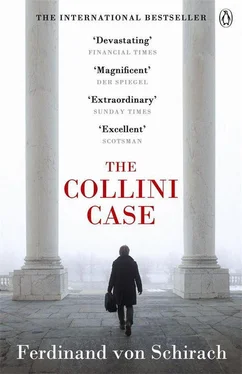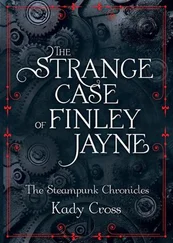Leinen crossed the street to the hotel. His bag was already in his room. He undressed and went into the bathroom. He took a shower so hot that it hurt, and slowly relaxed. When he came back into the room, naked, Johanna was standing at the window; she must have a spare key. She had drawn one of the curtains back just a little way and was looking out at the street, a shadowy outline against the blue-green sky. In silence he came up behind her, in silence she leaned against him, her hair on his chest. He put his arms round her, and she caressed his hands. It had been snowing outside; the cars went gliding by silently, the roof of a tram was white. After a while he pulled down the zip of her dress, slipped it off her shoulders and undid her bra. On the street below a man carrying his purchases out of a shop opposite slipped, steadied himself before falling, but dropped his bags, and small, orange cardboard boxes fell in the snow. Caspar kissed the back of her neck, her throat was warm; she took his hands and pressed them to her small breasts. She reached round behind herself and began caressing him there. The man in the street picked up his packages and hailed a taxi. Johanna turned round, her lips parted, and Caspar kissed her; her cheeks were wet, he tasted the salt. She took his face in her hands and held it; for a moment they stood still. Then she turned to the window again, arms leaning on the cover of the radiator, and straightened her back. He came into her, saw her shoulder blades, her white skin, the thin film of moisture on her back, and everything was fragile, simultaneous and final.
Much later, tired, their passion spent, they lay on the bed and talked about Philipp, about Rossthal and their summer, until gradually the words died away. In his sleep, Caspar Leinen clenched one hand into a fist, as if trying to hold on to something transient.
He woke early. Johanna was lying on her back, her head in the crook of his elbow, breathing calmly and regularly. Leinen watched her for a long time, then stood up, got dressed in the dark, wrote her a note and quietly closed the door behind him. The lobby was crowded and noisy; a reps’ conference was being held in the hotel.
He went out and boarded a tram. The passengers looked tired, some of them were asleep in their seats, condensation clouded the inside of the windows. He got off at the Tivolistrasse stop, walked across the English Garden and went through the snow to the Kleinhesseloher See. Right in the city centre, not a kilometre from the street, he saw them: little grebes, tufted ducks, common and red-crested pochards, mallards, coots, grey and bar-headed geese, and a flock of carrion crows. In his childhood, his father had taught him about birds. Ravens, he had said, know everything. Leinen swept the snow off a park bench, sat down and watched the birds until the cold had hardened his face and made his shoulders stiff.
In the late afternoon, he called for Johanna at the Munich branch of the Meyer Works. They drove in his car to Rossthal, where they were planning to look through Hans Meyer’s private papers in search of answers. Rossthal was only an hour’s drive from Munich, or just over an hour, but when they arrived it seemed like another world. The house and grounds lay in the snow, the wintry light was tinged with blue. They drove over the circular forecourt and parked at the foot of the steps going up to the house. Frau Pomerenke, Meyer’s last housekeeper, opened the door. She came down the steps, a little unsteadily, and hugged Johanna with tears in her eyes. ‘Oh, Caspar,’ she added, ‘how good to see you home again too.’ She had lit a fire in the big hearth, and said there was supper for them in the kitchen, they’d only have to warm it up. Then she withdrew to her own two rooms next to the housekeeping office, and later they heard her TV switched on there.
Johanna and Leinen walked through rooms where the furniture and lamps were shrouded in white dust sheets. The shutters were closed. It was cool and quiet. Only the grandfather clock in the library ticked away; someone was still winding it daily. In the study, light fell through a crack between the curtains and divided the top of the desk into broad strips. This was where Hans Meyer used to read the newspapers every day. They were always ironed first in the kitchen, so that they would stay crisp and the printer’s ink wouldn’t come off on his hands. The two of them stood in the room, motionless, looking at the desk. Johanna tore herself away from the sight of it first; she put her arms round Leinen and kissed him, and he felt as if she wanted to assure herself that they were alive.
They took the dust sheets off the desk and found its two drawers unlocked, containing nothing but notepaper of various sizes with matching envelopes, a collection of pencils, two old fountain pens, a dictating machine with empty cassettes. On the shelves stood countless files, neatly labelled: accounts, household records, invitations, business and private correspondence, all filed by years and alphabetically. They sat on the two dark green sofas, leafing through a whole series of photograph albums, also arranged in chronological order. Leinen remembered how Philipp and he used to look at them: family parties, safaris in Africa, hunting in the Austrian mountains. They knew most of the faces in the pictures. Johanna found a cuttings book labelled ‘Caspar Leinen’. Hans Meyer had stuck documents sent to him by Leinen as a child into this album: certificates that he had won in the National Youth Games, beginner’s and advanced swimming certificates, second place in the boarding schools’ downhill skiing championship. Later, Hans Meyer had got his company’s legal department to send him the essays and discussions of verdicts that Leinen had written in legal journals. They too were inside that file in their transparent folders. Sometimes Meyer had highlighted a sentence or added a question mark to a paragraph.
After a few hours they felt hungry and went off to the kitchen. There was roast beef, and the new bread that the cook had baked for them, still warm from the oven. They talked quietly, because sounds had a false note to them in the dark. Johanna talked about her marriage. Her husband had been there for her when her parents died, she said, day after day he had sheltered her from loneliness and death. But gradually everyday life had caught up with her. A moment came when she didn’t like to see him there at breakfast, she told Leinen; she’d known that would pass off by evening, but at breakfast the next day she didn’t like to see him facing her again. She’d put up with that for two years, and then it was no use any more. For some time now they had been living their separate lives, she in London, he in Cambridge. It hadn’t worked out as she had expected.
Later, they took the dust sheets off the old grand piano. Johanna played the Blüthner, but it was out of tune and sounded tinny and wrong in the empty house. Still later, they went up to the room that had been hers as a girl. They slept together under mountains of covers, falling asleep slowly, close to one another, feeling the warmth of each other’s skin. Shipwrecked sailors on a raft, thought Leinen. And then he realized that they were not ‘in love’, that was a meaningless concept – this was simply the way they were.
When he woke up, he thought he could hear the barking of the dogs in the morning, as he had in the old days, and the clatter of crockery in the dining room, and for a moment Philipp was there with him. He looked just as he always had at that time of day: pale, his hair untidy, in pyjamas and with his dressing gown unbelted. He had a cigarette in the corner of his mouth; he smiled and waved. Leinen sat on the window seat. It had been snowing again overnight. The snow had settled on the dark model of a crane in front of the orangery, and its beak seemed to be frozen in the ice of the fountain.
Читать дальше












